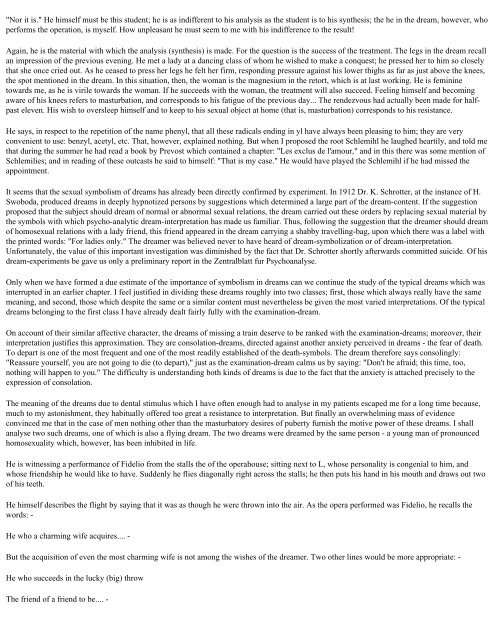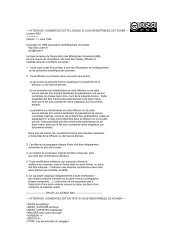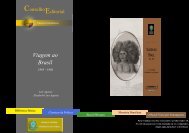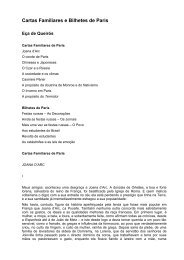The Interpretation of Dreams Sigmund Freud (1900)
The Interpretation of Dreams Sigmund Freud (1900)
The Interpretation of Dreams Sigmund Freud (1900)
Create successful ePaper yourself
Turn your PDF publications into a flip-book with our unique Google optimized e-Paper software.
"Nor it is." He himself must be this student; he is as indifferent to his analysis as the student is to his synthesis; the he in the dream, however, who<br />
performs the operation, is myself. How unpleasant he must seem to me with his indifference to the result!<br />
Again, he is the material with which the analysis (synthesis) is made. For the question is the success <strong>of</strong> the treatment. <strong>The</strong> legs in the dream recall<br />
an impression <strong>of</strong> the previous evening. He met a lady at a dancing class <strong>of</strong> whom he wished to make a conquest; he pressed her to him so closely<br />
that she once cried out. As he ceased to press her legs he felt her firm, responding pressure against his lower thighs as far as just above the knees,<br />
the spot mentioned in the dream. In this situation, then, the woman is the magnesium in the retort, which is at last working. He is feminine<br />
towards me, as he is virile towards the woman. If he succeeds with the woman, the treatment will also succeed. Feeling himself and becoming<br />
aware <strong>of</strong> his knees refers to masturbation, and corresponds to his fatigue <strong>of</strong> the previous day... <strong>The</strong> rendezvous had actually been made for halfpast<br />
eleven. His wish to oversleep himself and to keep to his sexual object at home (that is, masturbation) corresponds to his resistance.<br />
He says, in respect to the repetition <strong>of</strong> the name phenyl, that all these radicals ending in yl have always been pleasing to him; they are very<br />
convenient to use: benzyl, acetyl, etc. That, however, explained nothing. But when I proposed the root Schlemihl he laughed heartily, and told me<br />
that during the summer he had read a book by Prevost which contained a chapter: "Les exclus de l'amour," and in this there was some mention <strong>of</strong><br />
Schlemilies; and in reading <strong>of</strong> these outcasts he said to himself: "That is my case." He would have played the Schlemihl if he had missed the<br />
appointment.<br />
It seems that the sexual symbolism <strong>of</strong> dreams has already been directly confirmed by experiment. In 1912 Dr. K. Schrotter, at the instance <strong>of</strong> H.<br />
Swoboda, produced dreams in deeply hypnotized persons by suggestions which determined a large part <strong>of</strong> the dream-content. If the suggestion<br />
proposed that the subject should dream <strong>of</strong> normal or abnormal sexual relations, the dream carried out these orders by replacing sexual material by<br />
the symbols with which psycho-analytic dream-interpretation has made us familiar. Thus, following the suggestion that the dreamer should dream<br />
<strong>of</strong> homosexual relations with a lady friend, this friend appeared in the dream carrying a shabby travelling-bag, upon which there was a label with<br />
the printed words: "For ladies only." <strong>The</strong> dreamer was believed never to have heard <strong>of</strong> dream-symbolization or <strong>of</strong> dream-interpretation.<br />
Unfortunately, the value <strong>of</strong> this important investigation was diminished by the fact that Dr. Schrotter shortly afterwards committed suicide. Of his<br />
dream-experiments be gave us only a preliminary report in the Zentralblatt fur Psychoanalyse.<br />
Only when we have formed a due estimate <strong>of</strong> the importance <strong>of</strong> symbolism in dreams can we continue the study <strong>of</strong> the typical dreams which was<br />
interrupted in an earlier chapter. I feel justified in dividing these dreams roughly into two classes; first, those which always really have the same<br />
meaning, and second, those which despite the same or a similar content must nevertheless be given the most varied interpretations. Of the typical<br />
dreams belonging to the first class I have already dealt fairly fully with the examination-dream.<br />
On account <strong>of</strong> their similar affective character, the dreams <strong>of</strong> missing a train deserve to be ranked with the examination-dreams; moreover, their<br />
interpretation justifies this approximation. <strong>The</strong>y are consolation-dreams, directed against another anxiety perceived in dreams - the fear <strong>of</strong> death.<br />
To depart is one <strong>of</strong> the most frequent and one <strong>of</strong> the most readily established <strong>of</strong> the death-symbols. <strong>The</strong> dream therefore says consolingly:<br />
"Reassure yourself, you are not going to die (to depart)," just as the examination-dream calms us by saying: "Don't be afraid; this time, too,<br />
nothing will happen to you." <strong>The</strong> difficulty is understanding both kinds <strong>of</strong> dreams is due to the fact that the anxiety is attached precisely to the<br />
expression <strong>of</strong> consolation.<br />
<strong>The</strong> meaning <strong>of</strong> the dreams due to dental stimulus which I have <strong>of</strong>ten enough had to analyse in my patients escaped me for a long time because,<br />
much to my astonishment, they habitually <strong>of</strong>fered too great a resistance to interpretation. But finally an overwhelming mass <strong>of</strong> evidence<br />
convinced me that in the case <strong>of</strong> men nothing other than the masturbatory desires <strong>of</strong> puberty furnish the motive power <strong>of</strong> these dreams. I shall<br />
analyse two such dreams, one <strong>of</strong> which is also a flying dream. <strong>The</strong> two dreams were dreamed by the same person - a young man <strong>of</strong> pronounced<br />
homosexuality which, however, has been inhibited in life.<br />
He is witnessing a performance <strong>of</strong> Fidelio from the stalls the <strong>of</strong> the operahouse; sitting next to L, whose personality is congenial to him, and<br />
whose friendship he would like to have. Suddenly he flies diagonally right across the stalls; he then puts his hand in his mouth and draws out two<br />
<strong>of</strong> his teeth.<br />
He himself describes the flight by saying that it was as though he were thrown into the air. As the opera performed was Fidelio, he recalls the<br />
words: -<br />
He who a charming wife acquires.... -<br />
But the acquisition <strong>of</strong> even the most charming wife is not among the wishes <strong>of</strong> the dreamer. Two other lines would be more appropriate: -<br />
He who succeeds in the lucky (big) throw<br />
<strong>The</strong> friend <strong>of</strong> a friend to be.... -









